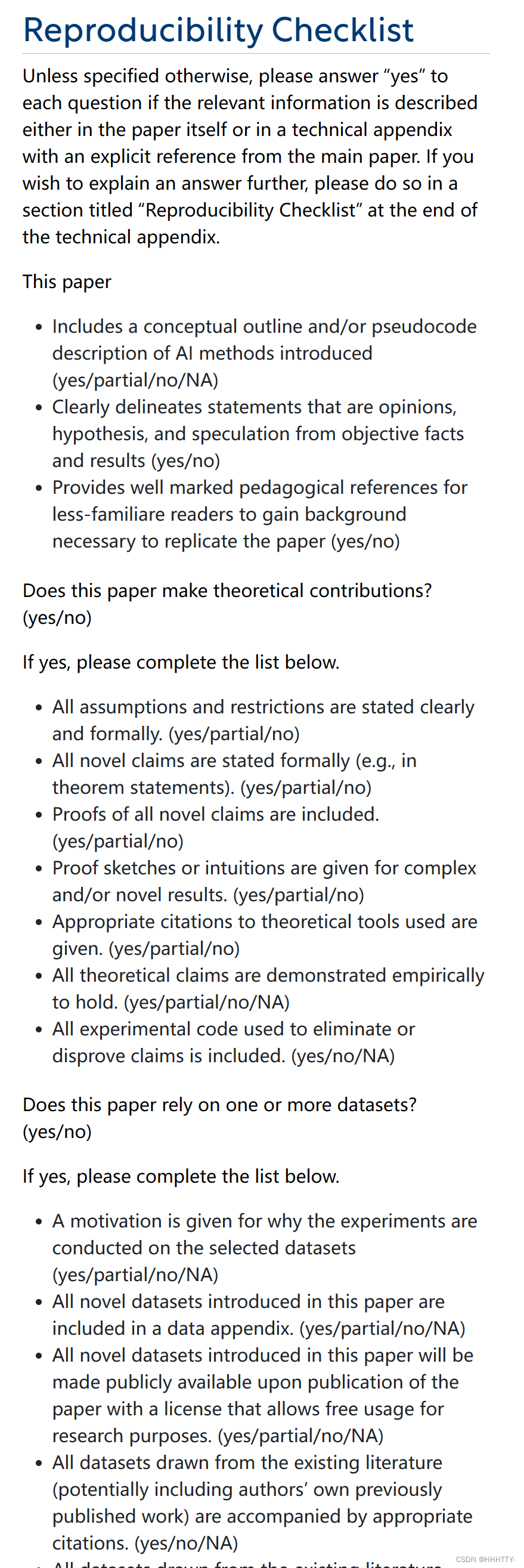- 1“听说你是个程序员,不能把时间消耗在阅读微信公众号上”_微信公众号内容阅读时长
- 2spring使用内置jetty创建提供http接口服务
- 3python网络爬虫实战教学——requests的使用(2)
- 4UR5 机器人 URDF 代码阅读
- 5如何3分钟在 Windows 11 上启用 Copilot_win11 copilot
- 6Mac电脑虚拟显示器:BetterDisplay Pro for Mac v2.0.11激活版
- 7VUE2.0详解_vue2.0使用
- 8docker部署nginx时,proxy_pass填localhost报错502_docker nginx 502
- 9vue使用全景图(krpano)_vue全景图
- 10Vue+Element UI 整合下拉目录树(popover+ tree+input)_elementui目录树
AAAI2024 The Thirty-Eighth Conference on Artificial Intelligence
赞
踩
目录
AAAI 2024
- submit:
https://cmt3.research.microsoft.com/AAAI2024
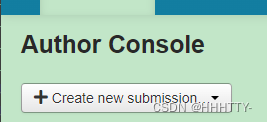
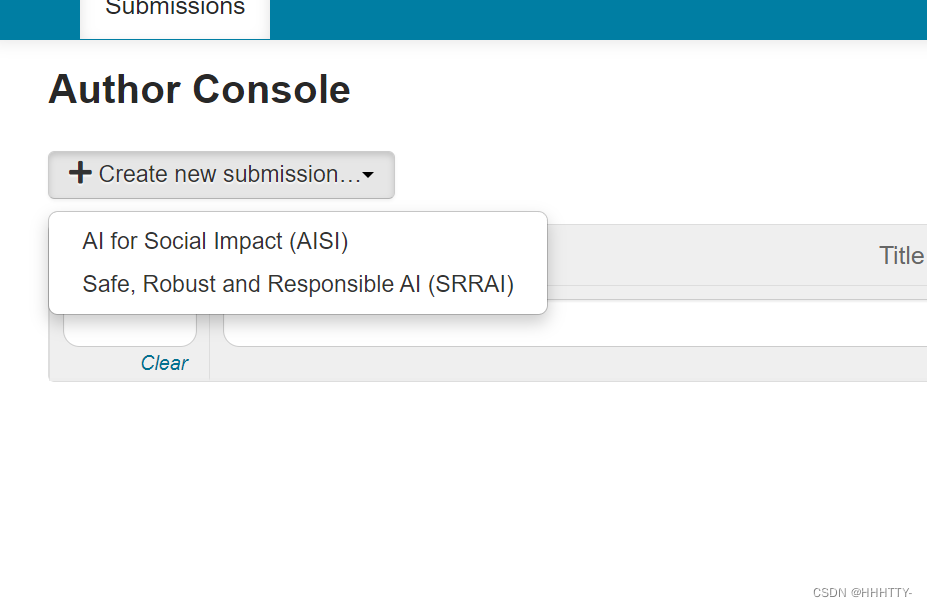
Past Conferences
For information about past AAAI Conferences, please consult the following pages.
- https://aaai.org/conference/aaai/
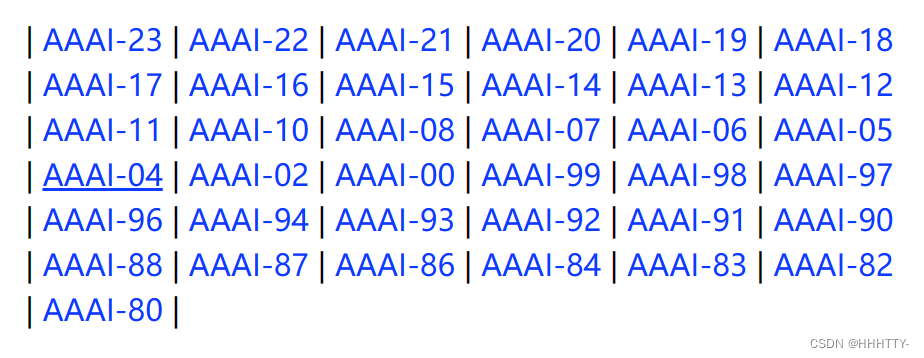
AAAI 2024
-
https://aaai.org/aaai-conference/
-
https://aaai.org/aaai-conference/aaai-24-call-for-proposals
2024 年 2 月在加拿大温哥华举行的第 38 届 AAAI 人工智能年度会议
- The Thirty-Eighth Conference on Artificial Intelligence will be held in Vancouver, British Columbia, Canada from February 20-27, 2024.
The 38th Annual AAAI Conference on Artificial Intelligence
Detailed Instructions
- https://aaai.org/aaai-conference/aaai-24-call-for-proposals/#conference-timetable
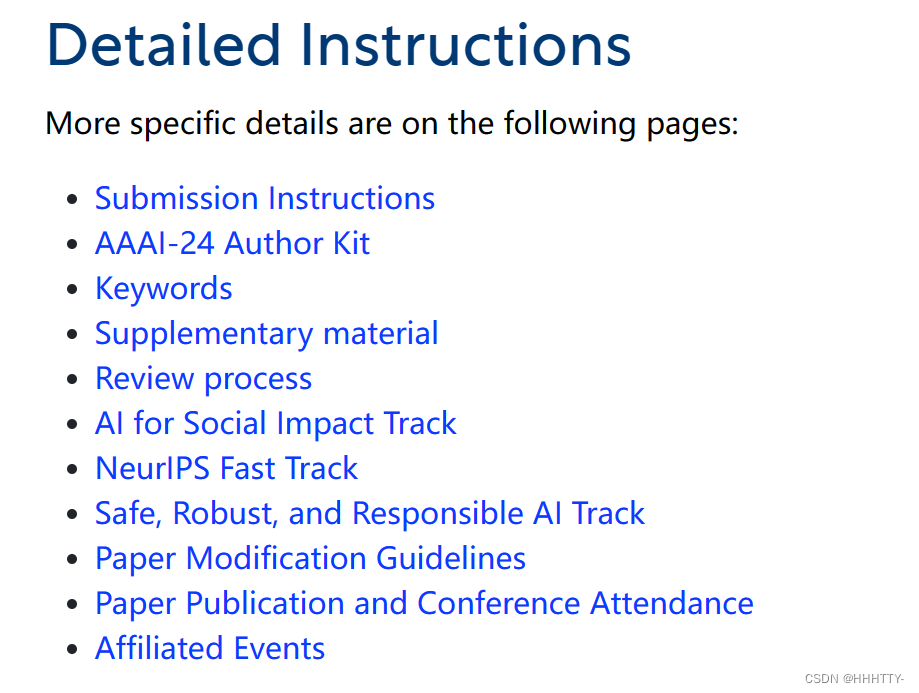
AAAI2024 模板
1、 https://aaai.org/aaai-conference/aaai-24-call-for-proposals/
2、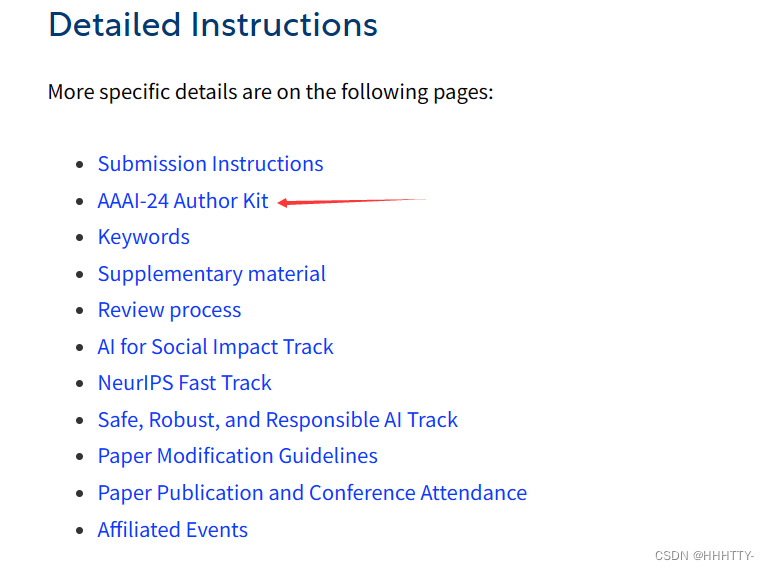
Timetable
- Main Conference Timetable for Authors
Note: all deadlines are “anywhere on earth” (UTC-12)
July 4, 2023
AAAI-24 web site open for author registration
July 11, 2023
AAAI-24 web site open for paper submission
August 8, 2023
Abstracts due at 11:59 PM UTC-12
August 15, 2023
Full papers due at 11:59 PM UTC-12
August 18, 2023
Supplementary material and code due by 11:59 PM UTC-12
September 25, 2023
Registration, abstracts and full papers for NeurIPS fast track submissions due by 11:59 PM UTC-12
September 27, 2023
Notification of Phase 1 rejections
September 28, 2023
Supplementary material and code for NeurIPS fast track submissions due by 11:59 PM UTC-12
November 2-5, 2023
Author feedback window
December 9, 2023
Notification of final acceptance or rejection
December 19, 2023
Submission of paper preprints for inclusion in electronic conference materials
February 20 – February 27, 2024
AAAI-24 conference
非常感谢你提供了第38届年度AAAI人工智能会议的详细时间表,该会议将于2024年2月20日至27日在加拿大温哥华举行:
注意:所有的截止日期均为“地球上的任何地方”(UTC-12)
2023年7月4日
AAAI-24网站开放作者注册
2023年7月11日
AAAI-24网站开放论文提交
2023年8月8日
摘要截止提交时间为晚上11:59(UTC-12)
2023年8月15日
全文截止提交时间为晚上11:59(UTC-12)
2023年8月18日
补充材料和代码截止提交时间为晚上11:59(UTC-12)
2023年9月25日
NeurIPS快速通道提交的注册、摘要和全文截止提交时间为晚上11:59(UTC-12)
2023年9月27日
第一阶段拒绝通知
2023年9月28日
NeurIPS快速通道提交的补充材料和代码截止提交时间为晚上11:59(UTC-12)
2023年11月2日至5日
作者反馈时间窗口
2023年12月9日
最终接受或拒绝通知
2023年12月19日
提交论文预印本以包含在电子会议材料中
2024年2月20日至27日
AAAI-24会议
Main Technical Track
- https://aaai.org/aaai-conference/aaai-24-call-for-proposals/#conference-timetable
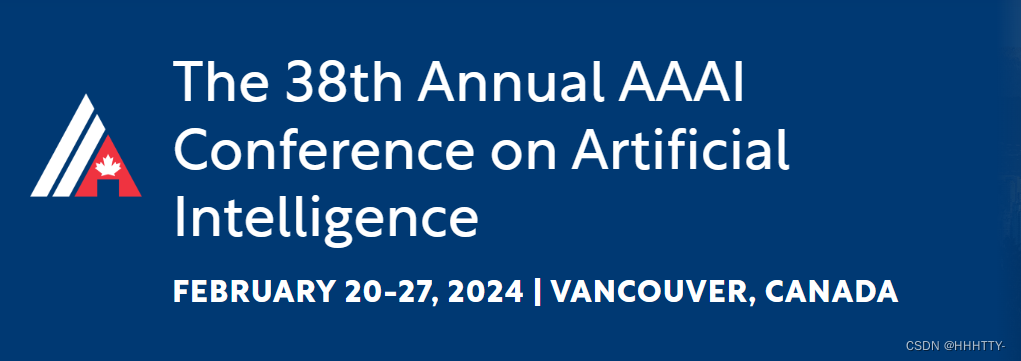
Summary
- Three technical tracks (Main Track; AI for Social Impact; Safe, Robust and Responsible AI)
- Two-phase reviewing: two reviews in Phase 1, additional reviews in Phase 2 for papers not rejected in Phase 1. Author response after Phase 2, only for papers not rejected in Phase 1.
- Three kinds of supplementary material may be submitted alongside all papers: (1) technical appendix; (2) multimedia; (3) code and data. Supplementary material deadline is 3 days after the paper submission deadline.
- Additional pages for references only.
- All authors must complete a reproducibility checklist, which facilitates replication of the reported research.
- All authors are expected to be available to review (light load), unless extenuating circumstances apply.
- NeurIPS-23 Fast Track: rejected papers with final, average scores of at least 4.9 may be submitted directly into AAAI-24’s Phase 2 along with, previous reviews and paper ID.
- 三个技术主题(主轨道;社会影响的人工智能;安全、健壮和负责任的人工智能)
- 两阶段的审稿:第一阶段有两次审稿,
- 第二阶段对第一阶段未被拒绝的论文进行额外审稿。
- 第二阶段之后的作者回应,仅针对第一阶段未被拒绝的论文。
- 所有论文都可以提交三种类型的补充材料:(1)技术附录;(2)多媒体;(3)代码和数据。
- 补充材料的截止日期是论文提交截止日期后的3天。
- 额外的参考文献页。
- 所有作者必须完成一个可复制性检查表,以便复制报告的研究。
- 除非有特殊情况,所有作者都应该提供审稿(轻载)。
- NeurIPS-23快速通道:被拒绝的论文,只要其最终、平均分数至少为4.9,就可以直接提交到AAAI-24的第二阶段,附上以前的审稿和论文ID。
The purpose of the AAAI conference series is to promote research in Artificial Intelligence (AI) and foster scientific exchange between researchers, practitioners, scientists, students, and engineers across the entirety of AI and its affiliated disciplines. AAAI-24 is the Thirty-Eighth AAAI Conference on Artificial Intelligence. As with AAAI-23, the theme of this conference is to create collaborative bridges within and beyond AI. In addition to the bridge theme, we emphasize the importance of AI for social impact and responsible AI. Like AAAI 2023 conference, AAAI-24 will feature technical paper presentations, special tracks, invited speakers, workshops, tutorials, poster sessions, senior member presentations, competitions, and exhibition programs, and two other activities: a Bridge Program and a Lab Program. Many of these activities are tailored to the theme of bridges and are selected according to the highest standards, with additional programs for students and young researchers.
We plan for AAAI-24 to be an in-person conference. Given the volatile situation, however, the exact format of the conference can only be decided at a later stage.
AAAI会议系列的目的是促进人工智能(AI)的研究,并促进研究者、实践者、科学家、学生和工程师之间的科学交流,涵盖AI及其相关学科的所有方面。
AAAI-24是第38届AAAI人工智能会议。和AAAI-23一样,此次会议的主题是创建AI内部和外部的合作桥梁。除了主题外,我们还强调AI对社会影响的重要性和负责任的AI。
像AAAI 2023会议一样,AAAI-24将包括技术论文展示、特别专题、邀请演讲人、研讨会、教程、海报环节、资深成员展示、竞赛和展示程序,以及其他两个活动:桥梁项目和实验室项目。许多这些活动都是根据最高标准定制的,与桥梁主题相吻合,并为学生和年轻研究者提供额外的程序。
我们计划AAAI-24会议为线下会议。然而,鉴于情况的不确定性,会议的确切形式只能在后期决定。
Topics
AAAI-24 welcomes submissions reporting research that advances artificial intelligence, broadly conceived. The conference scope includes machine learning, natural language processing, computer vision, data mining, multiagent systems, knowledge representation, human-in-the-loop AI, search, planning, reasoning, robotics and perception, and ethics. In addition to fundamental work focused on any one of these areas, we expressly encourage work that cuts across technical areas of AI (e.g., machine learning and computer vision; computer vision and natural language processing; or machine learning and planning), bridges between AI and a related research area (e.g., neuroscience; cognitive science), or develops AI techniques in the context of important application domains, such as healthcare, sustainability, transportation, and commerce.
The set of AAAI-24 keywords is available on the AAAI-24 keywords page. The author’s guide for choosing the best keywords describes important considerations in selecting keywords for a paper.
Most papers in AAAI-24 will be part of the main track. All main track papers will be reviewed according to the same criteria and via the same process. This conference has two special tracks, which focus on AI for Social Impact, and Safe, Robust, and Responsible AI. Papers in the special tracks will be reviewed according to a different evaluation rubric than papers in the main track. The same reviewing schedule will be followed for all papers.
主题
- AAAI-24欢迎提交报告,展示人工智能方面的研究进步,广义来说。
- 会议范围包括机器学习、自然语言处理、计算机视觉、数据挖掘、多代理系统、知识表示、人机交互的AI、搜索、规划、推理、机器人和感知以及伦理。
除了专注于这些领域的基础工作外,我们特别鼓励跨越AI的技术领域的工作(例如,机器学习和计算机视觉;计算机视觉和自然语言处理;或机器学习和规划)、在AI和相关研究领域之间建立桥梁(例如,神经科学;认知科学),或者在重要的应用领域中开发AI技术,如健康保健、可持续性、交通和商业。
AAAI-24关键词集可以在AAAI-24关键词页面上找到。
- 作者选择最佳关键词的指南描述了选择论文关键词的重要考虑因素。
AAAI-24的大部分论文将是主轨道的一部分。所有主轨道的论文将根据同样的标准进行审查,通过同样的过程。
此次会议有两个特殊专题,重点关注社会影响的人工智能和安全、健壮和负责任的人工智能。特别专题的论文将根据与主轨道论文不同的评估标准进行审查。所有论文将遵循相同的审稿时间表。
AAAI-2023
这段文字包含了关于提交论文到**第三十八届AAAI人工智能会议(AAAI-23)**的详细指南。以下是主要的几点内容:
- 作者注册:作者在提交论文和摘要前,必须在AAAI-23的在线技术论文提交网站上注册。作者在所有的提交和评审任务中,必须使用同一个CMT账户(即,与同一电子邮件地址相关联的账户)。
2. 摘要和论文提交:每次提交都需要提交摘要和对应的论文。对于普通论文,摘要必须在2022年8月8日之前提交,全文必须在2022年8月15日之前提交。对于快速轨道的论文,摘要和全文都必须在2022年9月16日之前提交。
3. 论文格式:论文必须按照AAAI两栏、适于出版的样式格式化。提交的论文应为无故障、高分辨率的PDF格式。
4. 双盲评审:AAAI的投稿是匿名的,必须遵守双盲评审的指示。
-
每位作者提交论文的数量限制:每位作者最多可以提交10篇论文到AAAI-23技术论文轨道(包括AI对社会影响和安全及稳健AI轨道的论文),并且在提交后,作者不能再被添加到论文中。
-
与会议或期刊的多次提交政策:AAAI-23不会考虑在提交时正在审查或已经在任何档案性场所(如期刊或会议)发布或接受发布的论文。
-
引用和比较:论文应该引用与其内容最相关的经过审查的出版物。
-
可复制性指南:作者在提交论文时,必须完成一个可复制性清单,这个清单概述了如何复制提交内容的结果。
-
伦理政策:所有的AAAI作者和审稿人都必须遵守AAAI出版伦理和不端行为声明,以及AAAI职业行为准则。
-
演示:在提交论文时,作者将能够表达对公开演示论文中描述的系统的兴趣。根据这些表示兴趣的表达和评审,论文将被选中参加演示环节,这将在技术讲座和海报之外进行。
AAAi2022论文模板在哪里呀?
https://www.zhihu.com/question/472604605/answer/2015631434
2023 example
官网:https://aaai-23.aaai.org/
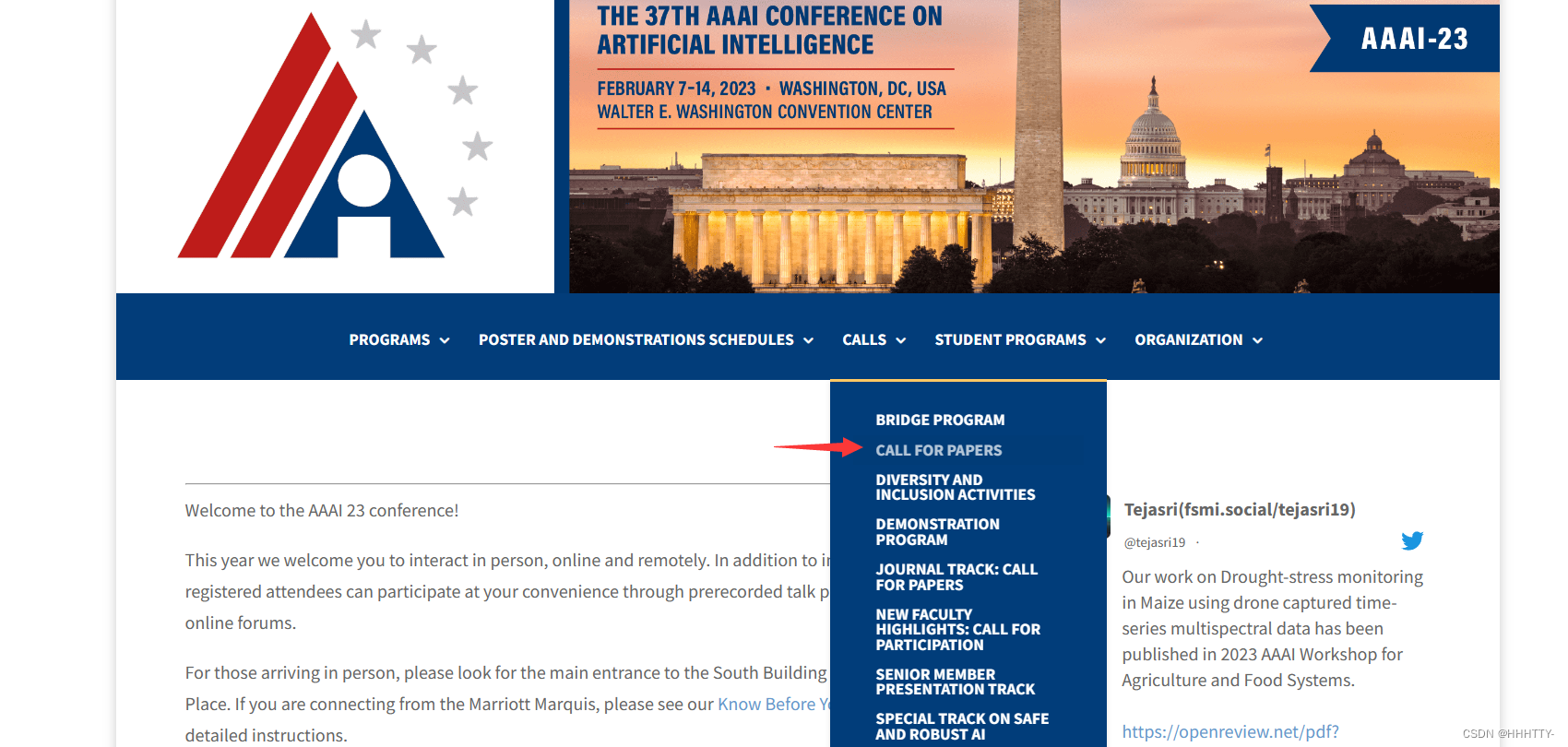
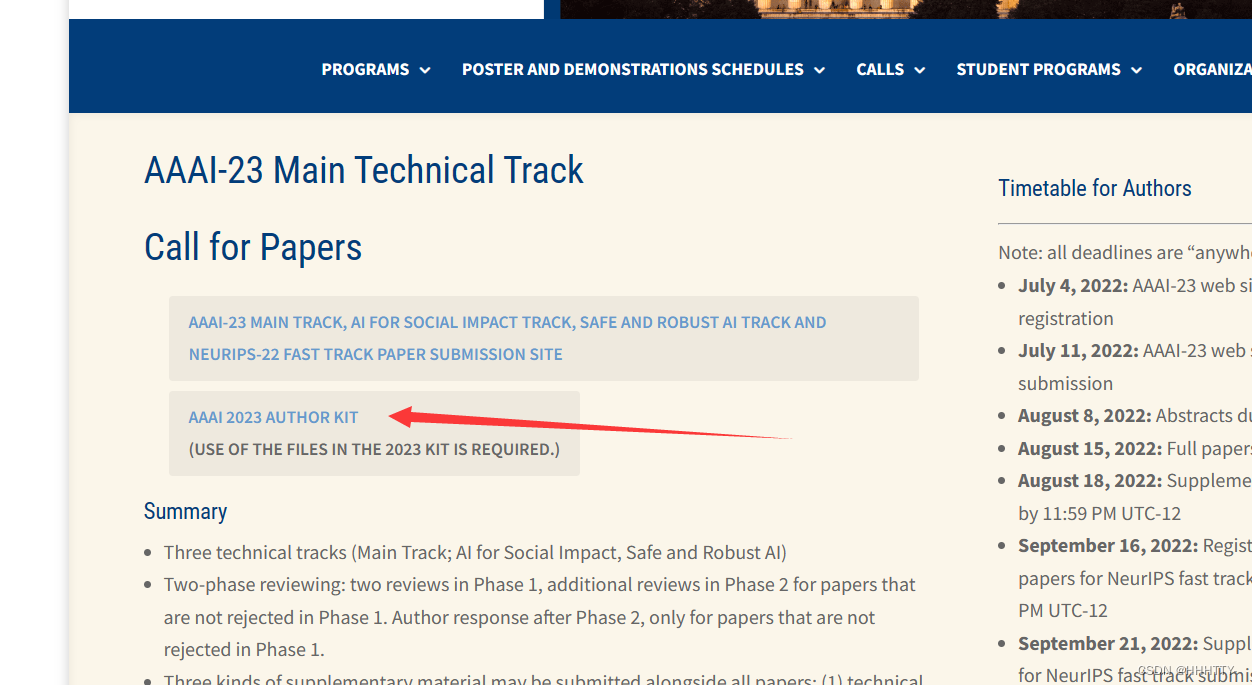
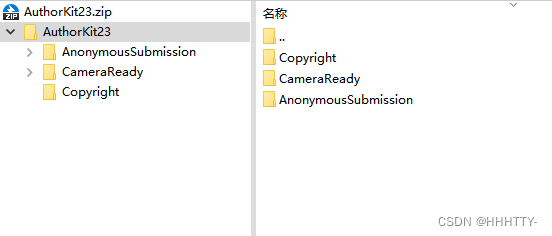
AAAI-24 Submission Instructions
1、Author Registration
Authors must register at the AAAI-24 web-based technical track paper submission site before they can submit abstracts and papers. To avoid last-minute congestion, authors are encouraged to register well in advance of the abstract deadline. Authors are required to use the same CMT account (i.e., associated with the same email address) across all submissions and review assignments.
IMPORTANT: Authors must enter the names of ALL AUTHORS at the time of registration (by abstract deadline) — CMT includes a hard-coded note that this is optional, however, this is a mandatory step for AAAI-24 authors. According to AAAI policy, all author names must be added at the time of abstract registration, and the list of names as well as the order in which they appear cannot be changed after August 15. In addition, the contact author and contact information cannot be changed after the abstract submission deadline. For the complete policy on Guidelines for Changes to Titles/Authors after Submissions, please see below.
Given the size of the conference, all authors of AAAI-24 submissions will be expected to join the conference’s reviewer pool unless prevented by extenuating circumstances. Potential reviewers will be vetted based on their research experience, and depending on this experience may be selected as program committee or senior program committee members.
作者在提交摘要和论文之前必须在AAAI-24基于网络的技术专题论文提交网站上进行注册。
- 为了避免最后时刻的拥堵,建议作者提前完成注册。
- 作者需要使用同一个CMT账户(即,关联相同电子邮件地址)提交所有的论文和审稿任务。
重要提示:在注册时(即摘要截止日期前)作者必须输入所有作者的名字——尽管CMT注明这一步骤是可选的,但对于AAAI-24的作者来说,这是必须完成的步骤。
- 根据AAAI的政策,所有的作者名字必须在提交摘要时添加,且一旦名单和作者顺序在8月15日之后不能再进行修改。
- 此外,联系作者和联系信息在摘要提交截止日期之后也不能更改。关于提交后修改标题/作者的详细政策,请参见下文。
考虑到会议的规模,预计AAAI-24的所有提交者将加入会议的审稿团队,除非有特殊情况阻碍。
- 潜在的审稿人将根据他们的研究经验进行审查,根据这些经验,他们可能被选为程序委员会成员或资深程序委员会成员。
2、Abstract and Paper Submission
very submission requires both an abstract submission and a corresponding paper submission. For regular papers, abstracts must be submitted by August 8, 2023 and full papers must be submitted by August 15, 2023. For fast track papers, both abstracts and full papers must be submitted by September 25, 2023. There will be no individual exceptions. If you experience any technical problems with the CMT site, please contact the AAAI-24 Workflow Chairs at workflowchairs24@aaai.zendesk.com.
Submissions will not be accepted by e-mail or any other mechanism other than CMT. After submission, the system will not automatically send a confirmation of receipt. If you want to receive a confirmation email, please click the paper ID to view the submission, and then click the “Email” button at the top right to send the confirmation to yourself or all the authors. AAAI will contact authors again only if problems are encountered with papers. We intend to close the submission system exactly at the deadline. Once the deadline has passed, we regret that we will be unable to make individual exceptions or to correspond with authors regarding circumstances that prevented timely submission.
At the time of abstract submission, authors should include a full title for their paper and a complete abstract in the fields provided. Submissions that have “placeholder” (e.g., test or xyz) titles or abstracts (or none at all) will be deleted. Authors of such vacuous submissions will be notified that their abstract has been deleted and will not be allowed to submit a full paper. The Program Chairs also reserve the right to reject papers without review if they change their abstracts substantially between the abstract and final deadlines.
Papers must be formatted in AAAI two-column, camera-ready style; see the AAAI-24 author kit for details. Papers must be in trouble-free, high-resolution PDF format, formatted for US Letter (8.5″ x 11″) paper, using Type 1 or TrueType fonts. AAAI submissions are anonymous and must conform to the instructions (detailed below) for double-blind review. The authors must remove all author and affiliation information from their submission for review, and may replace it with other information, such as paper number and keywords. Submissions may consist of up to 7 pages of technical content plus additional pages solely for references; acknowledgements should be omitted from papers submitted for review.
Only PDF files are required at the time of submission for review; authors will additionally need to submit paper source files if their paper is accepted for publication.
每一篇论文的提交都需要同时提交摘要和相应的论文。
- 对于常规论文,摘要必须在2023年8月8日之前提交,全文必须在2023年8月15日之前提交。
- 对于快速通道论文,摘要和全文都必须在2023年9月25日之前提交。将不会有个别例外。
- 如果你在使用CMT网站时遇到任何技术问题,请联系AAAI-24工作流主席workflowchairs24@aaai.zendesk.com。
论文提交将不接受通过电子邮件或其他任何方式除CMT之外的提交。
- 提交后,系统不会自动发送收据确认。如果你希望收到确认邮件,请点击论文ID查看提交,然后点击右上角的"Email"按钮向自己或所有作者发送确认邮件。
- 只有在论文出现问题时,AAAI才会再次联系作者。
- 我们打算在截止日期时关闭提交系统。一旦过了截止日期,我们将无法为个别情况做出例外,或与作者讨论阻止及时提交的情况。
在提交摘要时,作者应在提供的字段中为论文包括一个完整的标题和完整的摘要。
- 提交的标题或摘要是"占位符"(例如,测试或xyz)或根本没有的,将会被删除。
- 这样空洞的提交的作者将会收到通知,他们的摘要已被删除,且将不被允许提交全文。
- 如果他们在摘要和最终截止日期之间大幅度改变摘要,程序主席也保留拒绝审查论文的权利。
论文必须以AAAI双列,camera ready的样式进行格式化;详情请参见AAAI-24作者工具包。
- 论文必须是无故障,高分辨率的PDF格式,以美国信纸(8.5" x 11")格式,使用Type 1或TrueType字体。AAAI的提交是匿名的,必须符合双盲审查的指示(详见下文)。
- 作者必须从他们的审查提交中移除所有作者和机构信息,并可以用其他信息,如论文编号和关键词,来替代。
- 提交内容可以包括多达7页的技术内容,另外可以附加额外的仅供参考的页面;
- 致谢应从提交审查的论文中删除。只有在论文被接受出版时,作者还需要提交论文源文件。
Submission Limit per Author
Each individual author is limited to no more than a combined limit of 10 submissions to the AAAI-24 technical track (including papers in the AI for Social Impact and Safe and Robust AI tracks) and authors may not be added to papers following submission (see below for policies about author changes).
每个个别作者在AAAI-24的技术专题(包括AI for Social Impact和Safe and Robust AI专题)的提交总数不得超过10篇,且在提交后不得将作者添加到论文中(关于作者变更的政策,请见下文)。
Guidelines for Changes to Titles/Authors after Submissions
MODIFICATIONS TO SUBMISSIONS ARE ONLY ALLOWED UNTIL THE FULL PAPER DEADLINE (August 15 for Phase 1 submissions, September 25 for fast track submissions). No exceptions will be granted. Please see the full policy on Paper Modification Guidelines.
只允许在全文提交截止日期前(第一阶段提交的截止日期为8月15日,快速通道提交的截止日期为9月25日)对提交的内容进行修改。
不会有任何例外。请查看关于论文修改指南的完整政策。
Policy Concerning Multiple Submissions to Conferences or Journals
关于向会议或期刊提交多篇论文的政策
AAAI-24不会考虑任何在提交时正在审查中,或者已经在任何存档场所(如期刊或会议,工作坊和预印本服务器如arXiv是可接受的)出版或接受出版的论文。
- 作者可以从具有并发审查过程的场所(例如,从NeurIPS-23)撤回提交,并将同样的工作提交给AAAI-24作为常规论文,只要这种撤回发生在AAAI-24的提交之前。
- 作者必须在提交时确认论文不在另一个存档会议或期刊的审查中。
Citation and Comparison
Papers are expected to cite those refereed publications most relevant to their content, but authors are excused for not knowing about all non-refereed work (e.g, appearing on arXiv). Nevertheless, in cases where such prior work is widely known in the field, its existence may be considered by reviewers in assessing a submission’s novelty. Papers published less than two months before the regular paper submission deadline (August 15, 2023) are considered contemporaneous to all AAAI-24 submissions (whether submitted as regular or fast track submissions); authors are not obliged to address such papers (though, especially for the camera ready versions of accepted papers, authors are encouraged to do so).
论文应引用与其内容最相关的经过审查的出版物,但对于所有未经审查的工作(例如,出现在arXiv上的)作者们可以不知道。
- 然而,在这样的先前工作在领域内广为人知的情况下,审稿人可能会考虑到这些先前工作的存在,以评估提交内容的新颖性。
- 在常规论文提交截止日期(2023年8月15日)之前两个月内出版的论文将被视为与所有AAAI-24提交(无论是作为常规还是快速通道提交)同步的;作者无需处理这样的论文(尽管,特别是对于被接受论文的最终版本,我们鼓励作者这样做)。
Reproducibility Guidelines
Authors must complete a reproducibility checklist at the time of paper submission, which outlines how to reproduce the results of the submission. These responses will become part of each paper submission and will be shared with reviewers. Information related to reproducing experimental results described in the submission may be included in the main paper or the Code and Data Appendix, as appropriate. Further technical details (proofs, descriptions of assumptions, algorithm pseudocode) may be included in the Technical Appendix. When appropriate, authors are encouraged to include detailed information about each reproducibility criterion as part of their Technical Appendix. Reviewers will be asked to assess the degree to which the results reported in a paper are reproducible, and this assessment will be weighed when making final decisions about each paper.
可重复性指南
- 作者在提交论文时必须完成一个可重复性检查清单,该清单概述了如何重现提交内容的结果。
这些回应将成为每篇论文提交的一部分,并将与审稿人共享。- 与重现提交中描述的实验结果相关的信息可以包含在主论文或代码和数据附录中,视情况而定。
进一步的技术细节(证明,假设描述,算法伪代码)可以包含在技术附录中。- 在适当的情况下,鼓励作者在他们的技术附录中包含关于每个可重复性标准的详细信息。
审稿人将被要求评估论文报告的结果在何种程度上是可重复的,并将在做出关于每篇论文的最终决定时权衡这一评估。
Reproducibility Checklist
- https://aaai.org/aaai-conference/reproducibility-checklist/
AAAI-2020 投稿注意
https://zhuanlan.zhihu.com/p/81930463
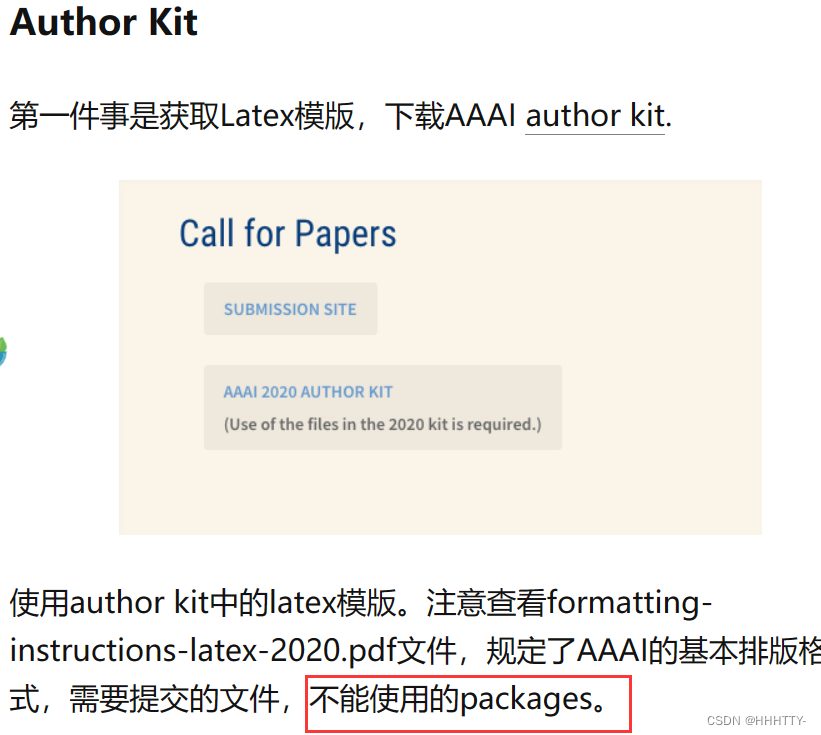
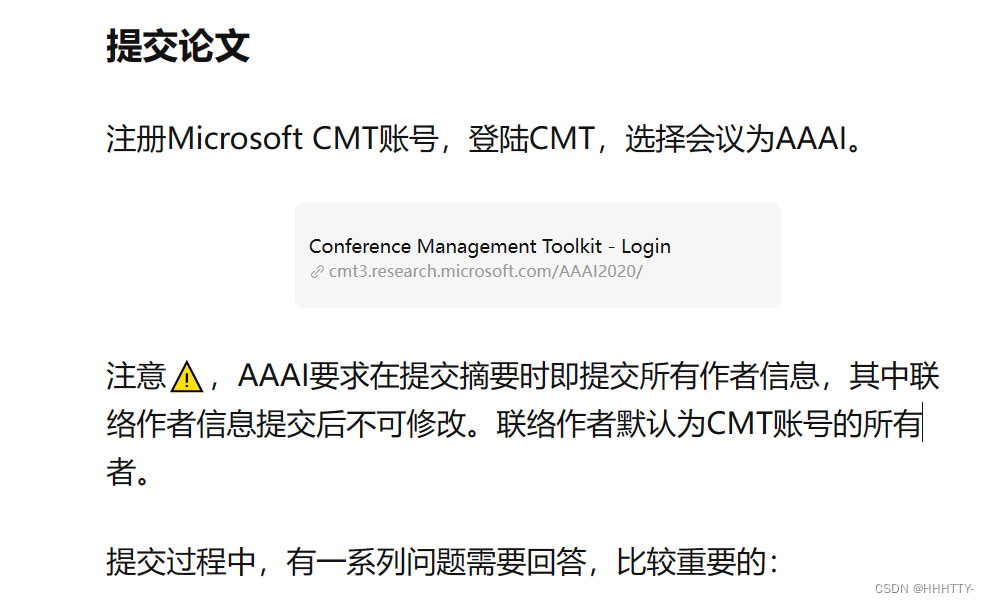
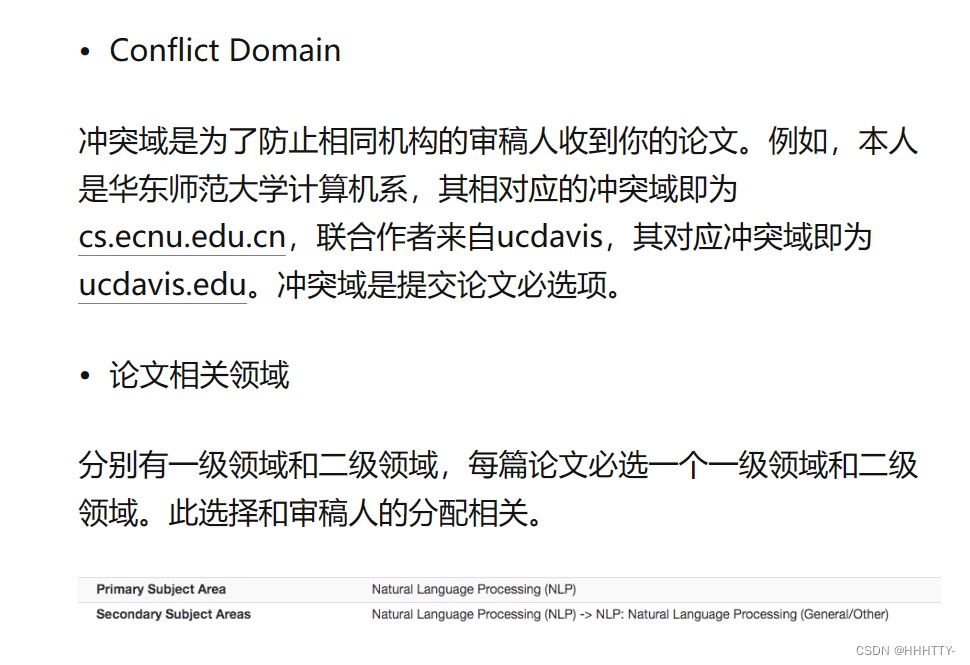
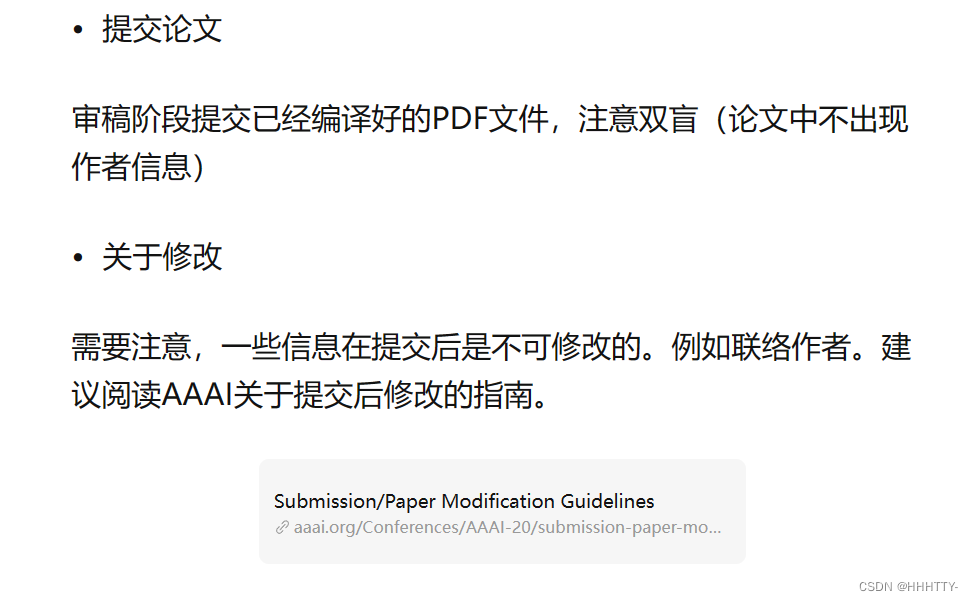
AAAI 2022 顶会投稿须知!附重要时间节点
https://zhuanlan.zhihu.com/p/398397348

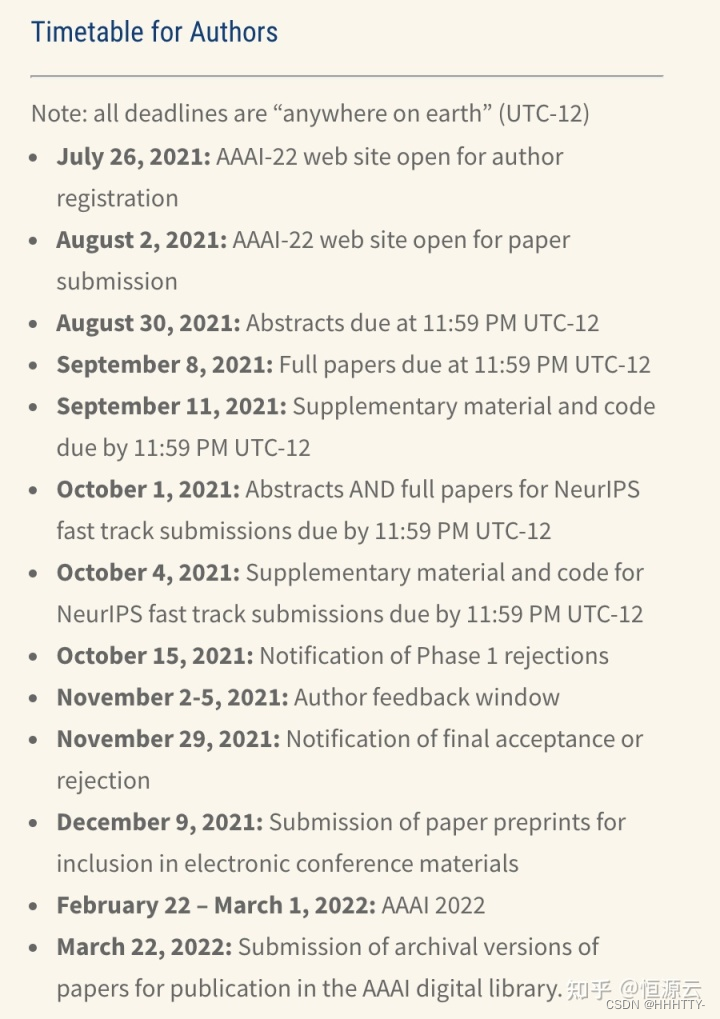
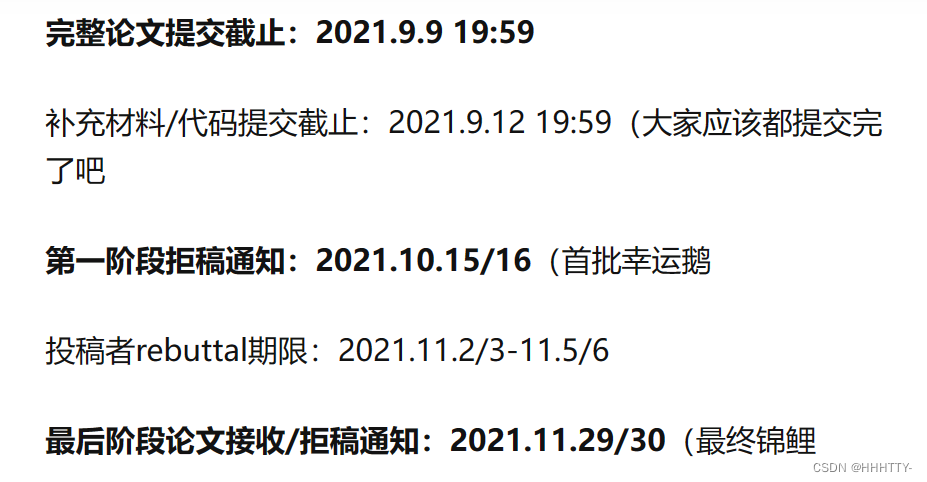
Questions and Suggestions 问题和建议
-
Please send queries about conference registration to aaai24@aaai.org.
-
Please direct inquiries about the submission process and the technical program to workflowchairs24@aaai.zendesk.com and pcchairs24@aaai.zendesk.com respectively.
-
Other general inquiries to the AAAI-24 General and Program Co-chairs can be directed to aaai24chairs@aaai.org.
请将关于会议注册的查询发送到aaai24@aaai.org。
请将关于提交过程和技术程序的查询分别发送到workflowchairs24@aaai.zendesk.com和pcchairs24@aaai.zendesk.com。
对AAAI-24总主席和程序联席主席的其他一般查询可以发送到aaai24chairs@aaai.org。
Supplementary Material
Submissions should not contain pointers to supplementary material on the web, as this may violate both blind review and the policy that submissions cannot be changed after they are made available to reviewers. However, authors have the option of submitting supplementary material in support of their submissions. Authors must be very careful not to violate the double blind review requirements in any supplementary material to prevent their paper from being summarily rejected. All such material is due no later than August 18 (regular papers), and September 25 (NeurIPS-23 fast track papers).
提交的内容不应包含指向网络上补充材料的指针,因为这可能违反双重审查和提交内容在提交给审稿人后不能更改的政策。
- 然而,作者可以选择提交支持他们提交内容的补充材料。
作者必须非常小心不要在任何补充材料中违反双重盲审的要求,以防止他们的论文被 summarily rejected。
所有这些材料的截止日期为8月18日(常规论文)和9月25日(NeurIPS-23快速通道论文)。
Authors can include one or more of the following:
a technical appendix (PDF) containing additional details in support of the arguments advanced by the main paper (e.g., proofs, experimental results, descriptions of datasets);
a multimedia appendix (ZIP) including images, audio files, video demonstrations, etc., in support of the paper;
code & data (ZIP) to aid the reviewers in assessing the reproducibility of the paper’s claims.
During review, the purpose of supplementary material is to assist reviewers. Authors are encouraged to share the supplementary material upon paper acceptance.
作者可以包括以下一项或多项:
a. 技术附录(PDF),包含支持主论文论点的额外详细信息(例如,证明,实验结果,数据集描述);
b. 多媒体附录(ZIP),包括图片,音频文件,视频演示等,以支持论文;
c. 代码和数据(ZIP),以帮助审稿人评估论文主张的可复制性。
在审查期间,补充材料的目的是协助审稿人。作者在论文被接受后,被鼓励分享补充材料。
Technical Appendix
The length of main submissions is strictly limited, as already described. Authors may optionally submit a technical appendix (PDF) containing additional supporting information such as proofs of theorems that are stated in the main paper; additional information needed to reproduce experiments; further experimental results; figures and examples to illustrate technical claims; etc. The main submission may reference the supplementary material, but should be self contained. Reviewers will be instructed to make their acceptance evaluations based on the main submission, and will not be obliged to consult the supplementary material. If proofs or other supplementary matter are an important part of the contribution, their essential elements should be included in the main paper.
如前所述,主要提交内容的长度是严格限制的。
- 作者可以选择提交一个技术附录(PDF),其中包含支持主论文的额外信息,
- 例如在主论文中陈述的定理的证明;
- 重现实验所需的额外信息;更多的实验结果;
- 描绘技术主张的图形和示例等。
- 主要提交内容可以引用补充材料,但应自成一体。
审稿人将被指示根据主要提交内容进行接受评估,并无义务查阅补充材料。- 如果证明或其他补充内容是贡献的重要部分,那么它们的关键元素应包含在主论文中。
Multimedia Appendix
Some authors may also wish to provide additional material, such as images, videos, audios or other multimedia to supplement their paper. All such files should be combined into a single .zip file and uploaded to the CMT server. As always, such submissions should be properly anonymized; authors are urged to take particular care to ensure that any submitted video avoids images of the authors, identifiable voices, university or lab logos, recognizable campus scenes, etc.
有些作者可能还希望提供额外的材料,如图片、视频、音频或其他多媒体来补充他们的论文。
- 所有这些文件应合并成一个.zip文件,并上传到CMT服务器。
- 同样,这样的提交内容应该进行适当的匿名处理;作者应特别注意确保提交的视频避开了作者的图像、可识别的声音、大学或实验室的标志、可识别的校园场景等。
Code & Data Appendix
Authors are encouraged to provide their software and all data needed to reproduce results in the paper as a third form of supplementary material. All files must be combined into a .zip file and uploaded to the CMT server. Reviewers may use this material to verify the claims made in the main paper and to assess the reproducibility of the work. If a dataset’s size exceeds the available max limit set by CMT, then authors are encouraged to upload a representative subset of their data.
作者被鼓励提供他们的软件和所有需要重现论文结果的数据,作为第三种形式的补充材料。
- 所有文件必须合并成一个.zip文件,并上传到CMT服务器。审稿人可能会使用这些材料来验证主论文中的主张,并评估工作的可重复性。
- 如果数据集的大小超过了CMT设定的可用最大限制,那么作者被鼓励上传他们数据的代表性子集。


